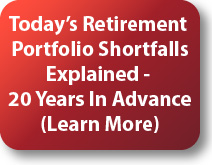Elections, Investments & The Battle For Future Wealth
by Daniel R. Amerman, CFA
Below is the 2nd half of this article, and it begins where the 1st half which is carried on other websites left off. If you would prefer to read (or link) the article in single page form, the private one page version for subscribers can be found here:
Battlefield Versus Clover Field
As an analogy for this financial battle, let's consider a World War I battlefield where we have vast numbers of soldiers/investors marching forward.
The artillery is raining down, the machine guns are cutting them down in vast numbers, and yet the lines of soldiers/investors never pause - they continue marching in lockstep towards their destination.
What is going on here?
As followers of the prevailing investment paradigm, whether they personally realize it or not, these soldiers/investors are following a school of thought, the theoretical foundation of which by definition excludes the predominately political division of limited resources in the future.
Their financial plans are oblivious to the artillery shells falling around them, because the existence of those artillery shells is precluded by definition.
Moreover, the deliberate stripping of wealth away from investors by way of Financial Repression and government intervention in markets is not allowed for in modern financial theory. So even as the machine gun fire of effectively zero interest rates destroys the carefully constructed theoretical foundations of financial planning, this is also ignored. That is because the existence of machine guns is also precluded by definition in the theoretical principles that underlie conventional retirement planning.
So everyone continues forward in their lines of tens of millions, marching in lockstep into the cannon fire, into the machine gun fire, because the theory upon which they rely asserts by definition that neither cannons nor machine guns exist, but that instead we can have great confidence that there will be an endless field of clover as the destination, vast enough to support every individual investor and every pension plan with effectively unlimited wealth.
For such is the core assumption that underlies conventional financial planning. That is, we already know the outcome, which is the compounding of investment wealth for all of us at historical rates, indefinitely and independent of everything else that's going on around us. And so the march of the investors continues, much like the early battles of World War I, until the damage reaches catastrophic proportions, by which time much of a generation is gone.
Five Fundamental Criteria
Are there alternatives to marching straight ahead into artillery and machine gun fire for decades to come?
I would say that there are, but that if we're going find a useful and sensible alternative to modern financial theory, we need to consider a quite different approach that meets five fundamental criteria.
First, we have to assume that we can only achieve average results for the general approach that we are taking.
That is, the response by many people to extremely challenging financial conditions is not to change their personal paradigm, but to try to be better within the paradigm that isn't working in the first place. The assumption is made that they can invest better than those around them, and they continue with this approach for years at a time.
Now that can work for some individuals, but simple math shows that it can't work for large groups of investors. Therefore, most of the people who may be risking their financial security on their particular strategies performing better than the similar strategies of those around them will in fact achieve results that are either average or below average, by the time all is said and done.
So we can't all rely on being smarter every year than all of those around us, while pursuing variations of the same strategies that they are using. Instead we need to work on a more fundamental level where just by our basic choices - which will be quite different from those around us - we are positioned so that merely being average in the execution of our strategies achieves the superior results that we need.
Second, we need to choose an approach by which our wealth will grow with future inflation.
When we have extraordinary promises that increase each year at a rate that is greater than the rate of economic growth, then we can fairly safely anticipate what the government is going to do as a political decision: it will be paying those promises in form but not in substance. That is, in dollar terms, the government is all too likely to be paying future retirement benefits more or less in full, but they will be with dollars that aren't worth nearly as much as they are today.
If you take a look at what has been happening to the annual increases in Social Security payments, and compare that to the annual price increases of food at the grocery store, you can get a pretty good picture of what's going on right now.
As investors we are best off aligning our financial interests with inflation, so that the greater the degree of inflation, the better that we do -- even if all we're doing is achieving average results for the strategy chosen.
There is a third criteria which is also important, and that has to do with this dominant financial force right now of near zero interest rates. As discussed, this is closely tied in with Financial Repression, as it also is with the global force of quantitative easing.
By definition, the purpose of Financial Repression is to take money from investors and redistribute it to the government. So the goal then should be to employ a strategy where the greater the degree of Financial Repression and the longer it lasts, the more wealth that is "naturally" distributed to us instead of away from us, even assuming that all we achieve is average results for the strategy chosen.
Our fourth criteria is rooted in the relationship between inflation and Financial Repression, which by design work together hand in glove to redistribute money from investors to the government. So our long term strategy for the future needs to be such that we prosper in a world of simultaneous inflation and repression, with both sides feeding into our net worth even as it's unfortunately destroying the lifestyles of those around us.
The fifth criteria is perhaps the most important of all. The rules of the game are based on law and regulation, they are based on politics, and there's a very good chance that what we're seeing with government control of interest payments is only the first step. We can anticipate that the government will continue to take actions to change the rules and the playing field in a manner that will redistribute wealth from investors and pass it through to politically favored sectors of society.
Now so long as elections come down to both sides promising transfer payment beneficiaries their future payments in full while neither looks after the true interests of long-term investors, this battle's already over before it's ever been fought. And those investing using conventional strategies will be paying the price in full.
So then, the fundamental questions become: "Is it possible for me to change my strategies and invest in such a way that the more wealth the government takes away from other investors, the more wealth that flows to me? Can I do this as a natural result of how I position myself, with no active trading or assumption of ongoing brilliance required?"
The answers can't be seen from inside the prism of modern investment theory. But let me suggest that it is the answering of these questions that are the most essential steps that an investor can take in today's investment environment.
When it came to the specifics of the issues explored in this article, a major battle was lost without even a fight in 2012. And there is little reason to expect different results in the elections to come.







